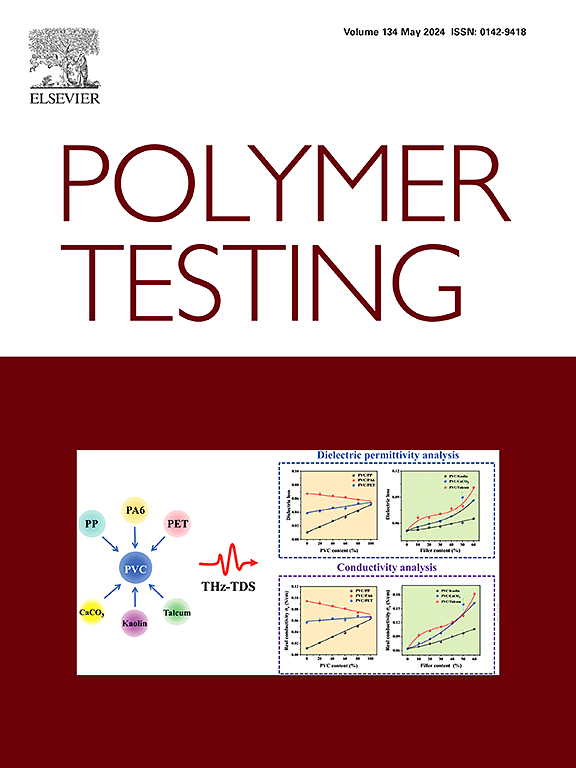Hydrothermal decomposition of virgin and waste polylactic acid with subcritical water under N2 and air atmospheres
IF 6
2区 材料科学
Q1 MATERIALS SCIENCE, CHARACTERIZATION & TESTING
引用次数: 0
Abstract
Bio-based polymers are an important step towards solving environmental problems, but there is a need to consider and develop procedures for dealing with these materials at the end of their life and to ensure that effective disposal methods are available. Recently, polylactic acid (PLA) has replaced many plastics based on non-renewable resources. In this work, subcritical water was used for the chemical decomposition of virgin and waste PLA under different atmospheres. The main degradation product was lactic acid with very high yields. The highest yield of lactic acid was obtained under N2 atmosphere, where the optimum conditions were 200 °C and 60 min and the yield was 88.96 ± 1.5 % for virgin PLA and 54.58 ± 1.3 % for waste PLA. In an air atmosphere, the maximum yields of lactic acid were obtained at 250 °C and 30 min and were slightly lower than in the N2 atmosphere, i.e. 87.20 ± 0.9 % for virgin PLA and 49.29 ± 0.6 % for waste PLA. The lower yield of lactic acid from waste PLA is due to the impurities and additives in waste PLA. Other carboxylic acids were also formed in the aqueous phase, while the gas phase mainly contained CO2, N2/CO and C1-C5 hydrocarbons. The hydrothermal degradation pathway was presented and the electricity costs for lab-scale PLA recycling were estimated. With this sustainable technology, PLA could be successfully recycled down to its monomer, providing a secondary raw material for the re-synthesis of the polymer, closing the loop and reducing the impact on the environment.

亚临界水在N2和空气环境下对原聚乳酸和废聚乳酸的水热分解
生物基聚合物是解决环境问题的重要一步,但有必要考虑和制定处理这些材料的程序,并确保有效的处置方法可用。近年来,聚乳酸(PLA)已经取代了许多基于不可再生资源的塑料。本研究采用亚临界水在不同气氛下对聚乳酸进行化学分解。主要降解产物为乳酸,产率很高。在N2气氛下乳酸得率最高,最佳条件为200℃,60 min,乳酸得率为88.96±1.5%,乳酸得率为54.58±1.3%。在空气气氛下,乳酸的最大产率在250°C和30 min时获得,略低于在N2气氛下的产率,即原始PLA为87.20±0.9%,废PLA为49.29±0.6%。废pla的乳酸产率较低是由废pla中的杂质和添加剂造成的。其他羧酸也在水相中形成,而气相中主要含有CO2、N2/CO和C1-C5碳氢化合物。提出了水热降解途径,并估计了实验室规模PLA回收的电力成本。有了这种可持续的技术,聚乳酸可以成功地回收到其单体,为聚合物的重新合成提供了二次原料,关闭了循环并减少了对环境的影响。
本文章由计算机程序翻译,如有差异,请以英文原文为准。
求助全文
约1分钟内获得全文
求助全文
来源期刊

Polymer Testing
工程技术-材料科学:表征与测试
CiteScore
10.70
自引率
5.90%
发文量
328
审稿时长
44 days
期刊介绍:
Polymer Testing focuses on the testing, analysis and characterization of polymer materials, including both synthetic and natural or biobased polymers. Novel testing methods and the testing of novel polymeric materials in bulk, solution and dispersion is covered. In addition, we welcome the submission of the testing of polymeric materials for a wide range of applications and industrial products as well as nanoscale characterization.
The scope includes but is not limited to the following main topics:
Novel testing methods and Chemical analysis
• mechanical, thermal, electrical, chemical, imaging, spectroscopy, scattering and rheology
Physical properties and behaviour of novel polymer systems
• nanoscale properties, morphology, transport properties
Degradation and recycling of polymeric materials when combined with novel testing or characterization methods
• degradation, biodegradation, ageing and fire retardancy
Modelling and Simulation work will be only considered when it is linked to new or previously published experimental results.
 求助内容:
求助内容: 应助结果提醒方式:
应助结果提醒方式:


